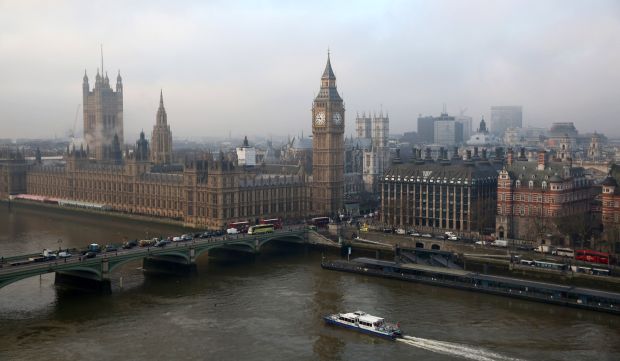
A general view of the Houses of Parliament and the river Thames in London, England, taken on January 21, 2014.(Oli Scarff/Getty Images)
London, Asharq Al-Awsat—A 2012 government decision to approve two arms export licenses for dual-use chemicals to Syria as “irresponsible,” the UK House of Commons Committees on Arms Export Controls said in a report published Wednesday.
Although the materials were not shipped to Syria because an EU arms embargo was subsequently imposed due to the escalating conflict, Committees criticized the move, as well as earlier exports of dual-use chemicals to Syria by UK-based firms.
The report, produced by four committees tasked with scrutinizing British policy on arms exports, also said that the government’s approval of five licenses for dual-use chemical exports to Syria between 2004 and 2010 was “highly questionable.”
The two chemicals concerned in the export licenses, sodium fluoride and potassium fluoride, can be used for the manufacture of sarin, the nerve agent used in chemical attacks that killed hundreds of people in Ghouta, east of the Syrian capital of Damascus, in August 2013.
In the export license applications, their declared civilian use was the manufacture of toothpaste and aluminum window frames.
The Committees also said they unable to produce a complete report on the issue due to the government’s refusal to provide details on the companies that were granted licenses.
In testimony before the Committees given in December 2013, Secretary of State for Business, Innovation and Skills Vince Cable justified the decision on the grounds that the government was concerned about possible reputational damage to the companies involved.
He described those companies as producers of “fairly standard chemical products” whose images could be tarnished by implications they had sold chemical weapons to the Syrian regime.
In his testimony, Cable also said no goods had been shipped under the two licenses granted in 2012 due to the introduction of an EU arms embargo on Syria.
Cable’s department is responsible for handling arms export license applications through the Export Control Organisation.
In his comments on the report, Committees chair Sir John Stanley called on the government to consider whether existing export controls on dual-use chemicals “need to be widened and strengthened, and, if so, in what ways.”
The UK government came under intense scrutiny earlier this month after a leaked document showed UK firms had sold chemical weapons precursors to Syria in the 1980s.
Speaking of those sales in the 1980s, then-foreign secretary William Hague said in a statement on July 9: “We judge it likely that these chemical exports by UK companies were subsequently used by Syria in their programmes to produce nerve agents, including sarin.”
Sir John also recommended in his memorandum that the UK government reconsider its position on the international legal status of the barrel bombs in widespread use by the regime of President Bashar Al-Assad.
Hague said in May that it was the government’s view that the use of barrel bombs was not in itself illegal, but could fall under the scope of international law if they were used indiscriminately against civilian targets.
In the report, which covered all aspects of the UK government’s arms export and arms control policy, the Committees recommended that “the Government should apply significantly more cautious judgements when considering arms export licence applications for goods to authoritarian regimes.”
